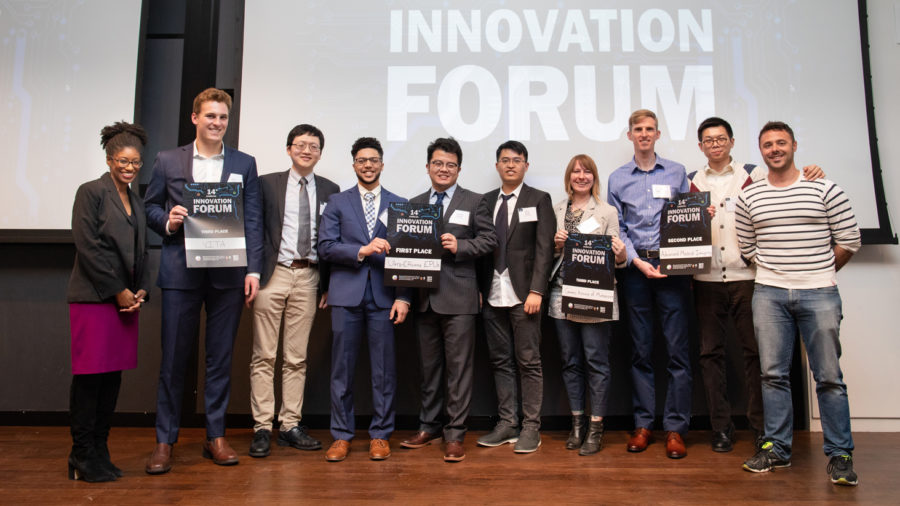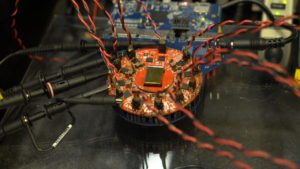Andlinger Center for Energy and Environment
Minjie Chen, assistant professor of electrical engineering and the Andlinger Center for Energy and the Environment, and his team of researchers from Princeton’s PowerLab, won first place for their ultra-efficient energy processor at Princeton University’s 14th annual Innovation Forum on Wednesday, Feb. 27.
The team includes Youssef Elasser and Ping Wang, who are graduate students in electrical engineering, and Yenan Chen, who is a postdoctoral researcher in electrical engineering and the Andlinger Center for Energy and the Environment.

The forum, organized by the Keller Center for Innovation in Engineering Education, showcases technology innovations from across the University and aims to help move scientific advances from lab to market. This year, nine teams competed and pitched their technologies.
The winning entry is a device that restructures power supply at gigantic data centers that serve as the backbone of modern cloud computing. These centers, often windowless buildings holding racks of computer servers, consume 90 billion kilowatt-hours of electricity each year in the U.S., generating as much atmospheric carbon dioxide as the entire U.S. airline industry, the inventors said.
The new type of power electronics device, the Energy Processing Unit (EPU), supplies power to computing units with extremely high efficiency. Because the EPUs are compact and efficient, the team believes they will cut electricity use by data centers, and could reduce the amount of space that these systems require by an estimated 20 percent.

Computers use only about 63 percent of the power that is delivered to the data centers. The rest is lost to the inefficiencies in current power electronics systems. By increasing the efficiency of the systems, the researchers say they can increase the amount of power delivered to computers to 88 percent.
The team said their invention would work with solar farms and battery storage systems as well as data centers.
“We look forward to bringing this solution to the real world,” said Youssef Elasser, who made the winning pitch at the competition. Ping Wang designed and fabricated the first version of the EPU. The senior technical lead of the team, Yenan Chen, plans to start a company based on this technology.
The win builds on related advances in power electronics, for which Prof. Chen was recognized last year. The work is supported by the DOE, NSF, Siebel Energy Institute, and the Andlinger Center for Energy and the Environment.
The Innovation Forum is sponsored by the Keller Center in conjunction with the Office of Technology Licensing, and Wiss & Company LLP. Judges for this year’s event included: Paul Chamberlain, Class of 1985, an early-stage investor and adviser to senior executives in emerging technology companies; Deborah Hoover, president and CEO of the Burton D. Morgan Foundation; Jake Leschly, Class of 1988, former president and CEO of Ingenuity Systems before its acquisition by Qiagen; Darrell Penn, 1999 graduate alumnus and director of corporate development for Merck and Co.; and Isa Watson, founder and CEO of Squad by Envested.
For more information on the event, see full coverage of the Innovation Forum on Princeton University’s homepage.